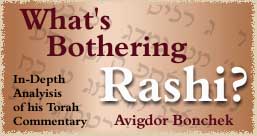

Back to this week's Parsha| Previous Issues
Parashas Pikudei
Another of those short interspersed comments. Here we see Rashi's ingenious subtly and his sensitivity to the Torah's every word. We must also be sensitive to every word in Rashi!
And all the work of the Tabernacle, the Tent of Meeting, was completed and the Children of Israel did everything that Hashem had commanded Moses, so they did. And the Children of Israel did: Rashi: the work according to all that Hashem commanded etc. What is Rashi Saying? Rashi adds just the two words, "the work." He is telling us that the Israelites did the work (of the Tabernacle). You certainly have a question on this comment! Your Question: Questioning Rashi
A Question: What has Rashi told us that we didn't know before? The verse is clearly telling us that the Children of Israel did the work. That is what the first half of the verse says, "And all the work of the Tabernacle was finished..."
Hint: There is also a problem here which is bothering Rashi.
See the whole verse. What is Bothering Rashi? ---What Misunderstanding?
An Answer: Did you notice that the word "to do" is repeated in this verse?
How does his comment solve this redundancy problem? Understanding Rashi
An Answer: By adding the words "the work" Rashi deftly accomplishes two things. A Closer Look
Rashi adds the words "the work," in Hebrew "es hamelacha" in his comment.
An Answer: The Torah uses the words "avodas hamishkan" meaning "the work of the Tabernacle."
Rashi, on the other hand, uses the words "es hamelacha" "the work." A Better Understanding An Answer: Though most English translations translate both these words - "avodah" and "melacha" as "work," this is imprecise. The word "avodah" means "work" in the sense of labor or toil. It is an activity. The word "melacha" on the other hand, means the product of that labor; an artifact created. This is how the words are used in verses 39:42-43.
In view of our understanding of Rashi's comment, i.e. that he is telling us that the word "vaya'asu" means "they made," (and not "they did") then the word "melacha" is appropriate and not the word "avodah.". A Lesson Rashi's verbal precision is amazing; his choice of words must always be an object of close scrutiny.
Back to this week's Parsha | Previous Issues
|